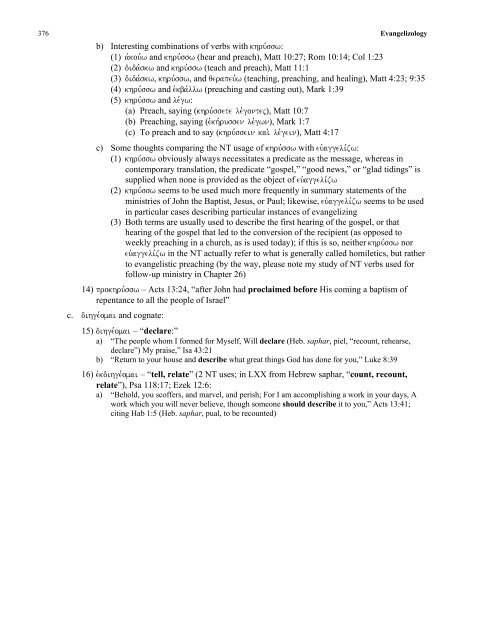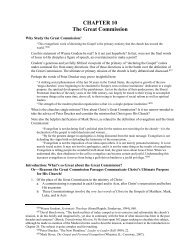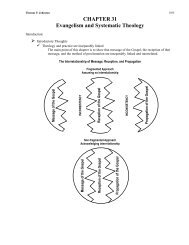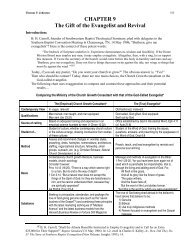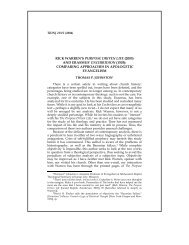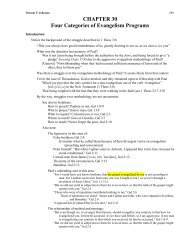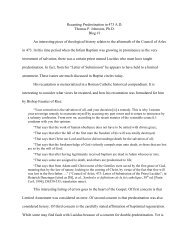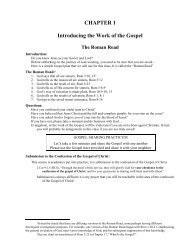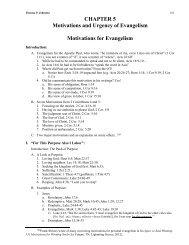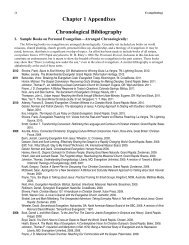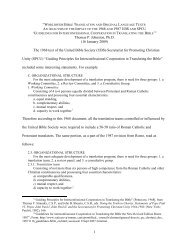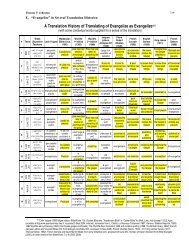CHAPTER 7 Defining Evangelizing - Evangelism Unlimited
CHAPTER 7 Defining Evangelizing - Evangelism Unlimited
CHAPTER 7 Defining Evangelizing - Evangelism Unlimited
Create successful ePaper yourself
Turn your PDF publications into a flip-book with our unique Google optimized e-Paper software.
376 Evangelizology<br />
b) Interesting combinations of verbs with khru,ssw:<br />
(1) avkou,w and khru,ssw (hear and preach), Matt 10:27; Rom 10:14; Col 1:23<br />
(2) dida,skw and khru,ssw (teach and preach), Matt 11:1<br />
(3) dida,skw, khru,ssw, and qerapeu,w (teaching, preaching, and healing), Matt 4:23; 9:35<br />
(4) khru,ssw and evkba,llw (preaching and casting out), Mark 1:39<br />
(5) khru,ssw and le,gw:<br />
(a) Preach, saying (khru,ssete le,gontej), Matt 10:7<br />
(b) Preaching, saying (evkh,russen le,gwn), Mark 1:7<br />
(c) To preach and to say (khru,ssein kai. le,gein), Matt 4:17<br />
c) Some thoughts comparing the NT usage of khru,ssw with euvaggeli,zw:<br />
(1) khru,ssw obviously always necessitates a predicate as the message, whereas in<br />
contemporary translation, the predicate “gospel,” “good news,” or “glad tidings” is<br />
supplied when none is provided as the object of euvaggeli,zw<br />
(2) khru,ssw seems to be used much more frequently in summary statements of the<br />
ministries of John the Baptist, Jesus, or Paul; likewise, euvaggeli,zw seems to be used<br />
in particular cases describing particular instances of evangelizing<br />
(3) Both terms are usually used to describe the first hearing of the gospel, or that<br />
hearing of the gospel that led to the conversion of the recipient (as opposed to<br />
weekly preaching in a church, as is used today); if this is so, neither khru,ssw nor<br />
euvaggeli,zw in the NT actually refer to what is generally called homiletics, but rather<br />
to evangelistic preaching (by the way, please note my study of NT verbs used for<br />
follow-up ministry in Chapter 26)<br />
14) prokhru,ssw – Acts 13:24, “after John had proclaimed before His coming a baptism of<br />
repentance to all the people of Israel”<br />
c. dihge,omai and cognate:<br />
15) dihge,omai – “declare:”<br />
a) “The people whom I formed for Myself, Will declare (Heb. saphar, piel, “recount, rehearse,<br />
declare”) My praise,” Isa 43:21<br />
b) “Return to your house and describe what great things God has done for you,” Luke 8:39<br />
16) evkdihge,omai – “tell, relate” (2 NT uses; in LXX from Hebrew saphar, “count, recount,<br />
relate”), Psa 118:17; Ezek 12:6:<br />
a) “Behold, you scoffers, and marvel, and perish; For I am accomplishing a work in your days, A<br />
work which you will never believe, though someone should describe it to you,” Acts 13:41;<br />
citing Hab 1:5 (Heb. saphar, pual, to be recounted)


